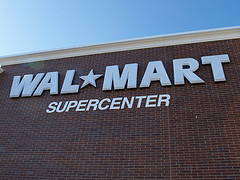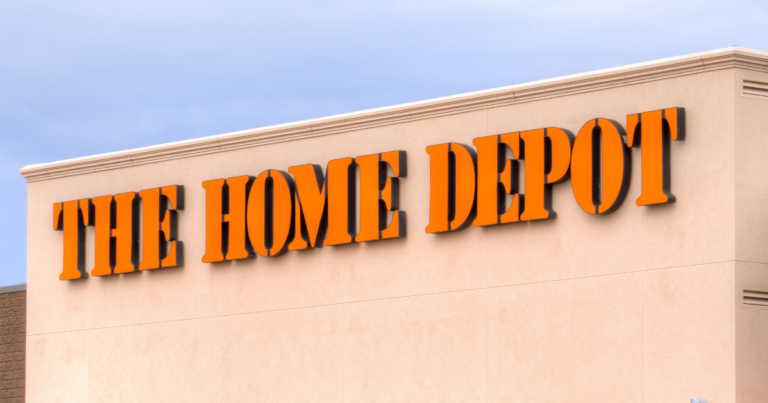Yesterday, Walmart announced a major update to their corporate chemicals policy with the release of their new Sustainable Chemistry Implementation Guide, sending a strong message to suppliers, competing retailers and the chemical industry that toxic chemicals that build up in our bodies linked to cancer, birth defects and learning disabilities have no place in products sold on store shelves.
(Photo Credit: Ron Dauphin via photopin cc)
This is big news, as our Mind the Store campaign has been challenging Walmart and the other top ten US retailers to eliminate the Hazardous 100+ chemicals of high concern from their products. Yesterday, we responded to the new announcement with this statement. We congratulate Walmart on expanding their chemicals policy with the release of this new implementation guide. The million dollar question is – will their suppliers listen? How will Walmart ensure suppliers actually comply with this important new policy? Here, we take a look at some of the more exciting elements of the expanded policy, as well as some initial thoughts on how the policy can be improved.
Raising the bar for disclosure of chemicals of concern
 Arguably the most exciting elements of Walmart’s policy center on online and product-level disclosure. We are especially pleased that Walmart will now be requiring suppliers to disclose the presence of toxic chemicals of concern business-to-business through the Wercs, publicly on company websites, and even on product labels (!) beginning in January 2018. This new requirement should not only provide incentives for manufactures to reduce or eliminate the use of “priority” chemicals, to avoid having to list them on products, but also empower moms and dads to make smarter and healthier shopping choices for their families. The company is also attempting to address chemicals like fragrances, which most companies virtually never disclose. They recommend that disclosure should include “full disclosure of all ingredients including those typically protected under trade secrets (e.g. fragrances)” as well as “known residuals, contaminants and by-products”.
Arguably the most exciting elements of Walmart’s policy center on online and product-level disclosure. We are especially pleased that Walmart will now be requiring suppliers to disclose the presence of toxic chemicals of concern business-to-business through the Wercs, publicly on company websites, and even on product labels (!) beginning in January 2018. This new requirement should not only provide incentives for manufactures to reduce or eliminate the use of “priority” chemicals, to avoid having to list them on products, but also empower moms and dads to make smarter and healthier shopping choices for their families. The company is also attempting to address chemicals like fragrances, which most companies virtually never disclose. They recommend that disclosure should include “full disclosure of all ingredients including those typically protected under trade secrets (e.g. fragrances)” as well as “known residuals, contaminants and by-products”.
The question is – will suppliers listen – and how will Walmart actually ensure fragrances and other additives are actually publicly disclosed?
Expanding “Priority” list of chemicals – but what are their top ten?
This past fall, Walmart announced their new chemicals policy and were going to be prioritizing a list of ten chemicals as an initial list of “high priority” chemicals for “continuous reduction, restriction and elimination”, yet the company never disclosed the names of these chemicals. Unfortunately, Walmart is still not disclosing the names of these chemicals for “business reasons” and state that these ten chemicals are “based on (a) authoritative lists, (b) current and pending regulatory lists, (c) high prevalence in Walmart products, and (d) concerns of direct exposure to consumers.” So that leaves about 2 or 3,000 chemicals to choose from. Hmmmm, any guesses as to what ones they may be? We are disappointed that Walmart has still not disclosed their initial ten “high priority” chemicals, despite public pledges to do so. In the interest of transparency, we call on Walmart to reconsider their decision to not disclose these “high priority” chemicals. After all, American families have the right to know.
On the positive side, Walmart has announced a brand new set of “Walmart Priority Chemicals”, which is comprised of no less than twenty of the most important authoritative lists in the US and internationally identifying chemicals of high concern, such as California Proposition 65, US EPA PBT and chemical action plan chemicals, and the states of Washington and Maine chemicals, demonstrating the significance of state action on chemicals. We are very pleased that this list includes every single one of the lists we referenced on our Hazardous 100 list, and many more. While the company did not identify the actually chemicals on these lists, you don’t have to work so hard to find them. This could very well likely include thousands of chemicals, though right now it’s somewhat unclear if every single one of the substances on these lists are included, or not. By comparison, Target’s policy and list is also very significant, with over 1,000 substances.
Reducing, restricting and eliminating toxic chemicals
Walmart is now calling on suppliers to, reduce, restrict and eliminate these substances. The policy states that suppliers should:
“Reduce, restrict and eliminate use of priority chemicals using informed substitution principles. Walmart U.S. and Sam’s Club U.S. have defined a list of authoritative and regulatory lists, which will be made public, to identify “Walmart Priority Chemicals” within the scope of this policy…. All suppliers are expected to reduce, restrict and eliminate use of priority chemicals using informed substitution principles. Walmart U.S. and Sam’s Club U.S. have defined a list of authoritative and regulatory lists (made publicly available through Appendix 1) to identify “Walmart Priority Chemicals” within the scope of this policy.”
Tracking reduction of chemicals of concern
The company is using the Wercs database/website to notify suppliers when products they sell contain either a “Walmart Priority Chemical” or “Walmart High Priority Chemical”. Using the Wercs system, they will send an e-mail to each supplier indicating which products contain “high priority chemicals” and in the future, any time a product entered contains a “priority” or “high priority” chemical, the supplier will automatically be notified. They will also use the Wercs database to track the number of priority chemicals in products, as well as their reduction, using various metrics including quantifying reductions by weight, number of products, number of suppliers, and sales volume.
The company also plans to publicly report their progress on transparency, advancing safer formulation of products and DfE certification in the company’s 2016 Global Responsibility Report.
Getting off the toxic treadmill
Another significant element of their expanded policy is that Walmart is for the first time encouraging their suppliers to get off the toxic treadmill, and avoid “regrettable substitution” by evaluating the hazards of replacement chemicals and embracing best in class “informed substitution” and “alternatives assessment” principles. Walmart states:
“Informed substitution is the considered transition from a chemical of particular concern to safer chemicals or non-chemical alternatives [1]. Using informed substitution principles will mitigate hazard risks associated with product formulation and achieve compliance with Walmart’s Policy on Sustainable Chemistry in Consumables…In the aim of advancing safer formulated products and promoting informed substitution, Walmart recommends the major tenets of Alternatives Assessment, a process for identifying, comparing and selecting safer alternatives to priority chemicals (including those in materials, processes or technologies) on the basis of their hazards, performance, and economic viability[1][2]…”
In their guide, they cite many great resources, such as the Pharos Chemical and Material Library, BizNGO’s Chemical Alternatives Assessment Protocol, and the Lowell Center for Sustainable Production’s Alternatives Assessment Protocol. It’ll be interesting to see whether suppliers listen, and use these useful tools. It’s not easy, but it can be done.
What’s good for our pets is good for our children
 The policy impacts a number of categories of products sold at Walmart and Sam’s Clubs stores in the US, primarily cleaning products, cosmetics and personal care products, infant products, and pet supplies. This is a good list of products to start with, and we hope Walmart will expand this over time to all other categories where chemicals of high concern are often found, such as children’s toys, apparel, furniture, electronics, and food packaging.
The policy impacts a number of categories of products sold at Walmart and Sam’s Clubs stores in the US, primarily cleaning products, cosmetics and personal care products, infant products, and pet supplies. This is a good list of products to start with, and we hope Walmart will expand this over time to all other categories where chemicals of high concern are often found, such as children’s toys, apparel, furniture, electronics, and food packaging.
(Photo Credit: rumpleteaser via photopin cc)
We also hope Walmart will expand this policy to their stores globally. As a company that has enormous power and influence over their supply chain, if they can do it in the US, why not the rest of the world? Families worldwide deserve the same protections.
Will other retailers Mind the Store?
Today’s new announcement should be a call to action to other big box retailers, grocery stores, and drug store chains. We call on the other leading top ten retailers to join Walmart to Mind the Store and get tough on toxic chemicals. After all, with great market power comes great responsibility.
We look forward to working with Walmart and the other nine leading retailers to create similar action plans on the Hazardous 100+ list of toxic chemicals in the months to come.
Join us and share this good news with your friends.





